Related Research Articles
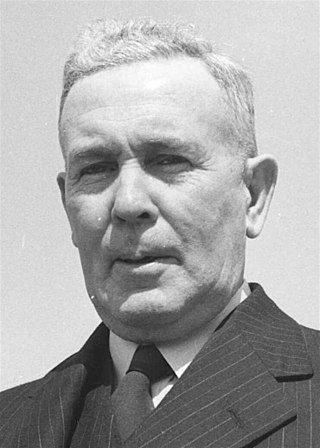
Joseph Benedict Chifley was an Australian politician and train driver who served as the 16th prime minister of Australia from 1945 to 1949. He held office as the leader of the Australian Labor Party (ALP), having previously served as the treasurer of Australia under Prime Minister John Curtin and later himself from 1941 to 1949. He was notable for defining Australia's post-war reconstruction efforts.

Arthur Augustus Calwell KC was an Australian politician who served as the leader of the Labor Party from 1960 to 1967. He led the party through three federal elections, losing each one in turn.
Robert James Ellis was an Australian writer, journalist, filmmaker, and political commentator. He was a student at the University of Sydney at the same time as other notable Australians including Clive James, Germaine Greer, Les Murray, John Bell, Robert Hughes and Mungo McCallum. He lived in Sydney with the author and screenwriter Anne Brooksbank; they had three children.

Anthony Sylvester Luchetti, AM was a long serving Australian federal member of parliament.
Peter Benton Bart is an American journalist and film producer, writing a column for Deadline Hollywood since 2015. He is best known for his lengthy tenure (1989–2009) as the editor in chief of Variety, an entertainment-trade magazine.
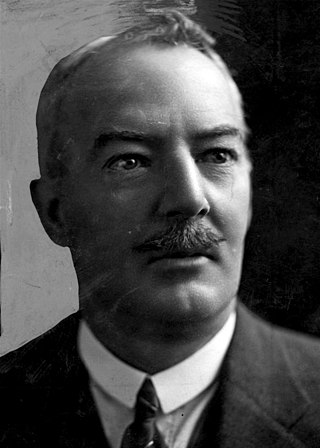
Edward James "Jack" Holloway was an Australian politician who served in the House of Representatives from 1929 to 1951, representing the Labor Party. He served as a government minister under James Scullin, John Curtin, Frank Forde, and Ben Chifley.

The 1949 Australian coal strike was the first time that Australian military forces were used during peacetime to break a trade union strike. The strike by 23,000 coal miners lasted for seven weeks, from 27 June 1949 to 15 August 1949, with troops being sent in by the Ben Chifley Federal Labor government to the open cut coal mines in New South Wales on 28 July 1949, with the workers returning to work, defeated, two weeks later.
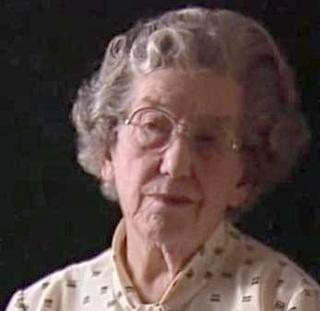
Eva Miriam Hart MBE was an Englishwoman who was one of the last remaining survivors of the sinking of RMS Titanic on 15 April 1912. At the time of the sinking she was seven years old.
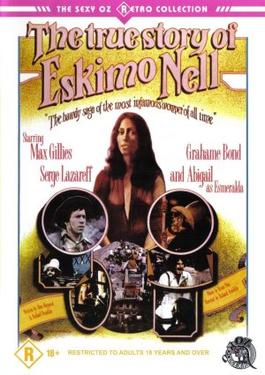
The True Story of Eskimo Nell is a 1975 Australian western comedy film produced, directed, and written by Richard Franklin, and starring Max Gillies as Deadeye Dick and Serge Lazareff as Mexico Pete. This was the first film produced by Richard Franklin.
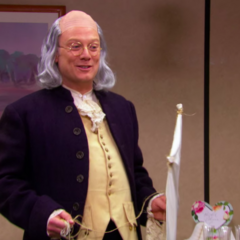
"Ben Franklin" is the fifteenth episode of the third season of the American comedy television series The Office and the show's forty-third episode overall. Written by Mindy Kaling, who also acts in the show as Kelly Kapoor, and directed by Randall Einhorn, the episode first aired in the United States on February 1, 2007, on NBC. "Ben Franklin" received 5.0/13 in the ages 18–49 demographic of the Nielsen ratings, and was watched by an estimated audience of 10.1 million viewers, and the episode received mixed reviews among critics.

The 1949 Australian federal elections was held on Saturday, 10 December, 1949. All 121 seats in the House of Representatives and 42 of the 60 seats in the Senate were up for election. The incumbent Labor Party, led by Prime Minister Ben Chifley, was defeated by the opposition Liberal–Country coalition under Robert Menzies in a landslide. Menzies became prime minister for a second time, his first period having ended in 1941. This election marked the end of the 8-year Curtin-Chifley Labor government that had been in power since 1941 and started the 23-year Liberal/Country Coalition government. This was the first time the Liberal party won government at the federal level.
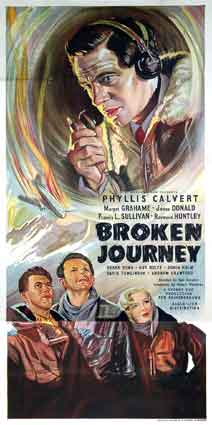
Broken Journey is a 1948 British drama film directed by Ken Annakin and featuring Phyllis Calvert, James Donald, Margot Grahame, Raymond Huntley and Guy Rolfe. Passengers and crew strugge to survive after their airliner crashes on top of a mountain; based on a true-life accident in the Swiss Alps.

Warm Nights on a Slow Moving Train is a 1988 Australian film directed by Bob Ellis and starring Wendy Hughes, Colin Friels, and Norman Kaye. Nominated at the AFI Awards in the Best Achievement in Cinematography category.
A by-election for the seat of Geelong in the Victorian Legislative Assembly was held on Saturday 13 November 1948. The by-election was triggered by the death of Labor member Fanny Brownbill on 10 October 1948.
True Believers is a 1988 Australian miniseries which looks at the history of the Australian Labor Party from the end of World War II up to the Australian Labor Party split of 1955.
The history of the Australian Labor Party has its origins in the Labour parties founded in the 1890s in the Australian colonies prior to federation. Labor tradition ascribes the founding of Queensland Labour to a meeting of striking pastoral workers under a ghost gum tree in Barcaldine, Queensland in 1891. The Balmain, New South Wales branch of the party claims to be the oldest in Australia. Labour as a parliamentary party dates from 1891 in New South Wales and South Australia, 1893 in Queensland, and later in the other colonies.
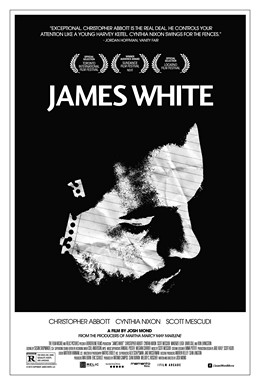
James White is a 2015 American drama film written and directed by Josh Mond. The film stars Christopher Abbott, Cynthia Nixon, Scott Mescudi, Ron Livingston, Makenzie Leigh and David Call. James, a twenty-something New Yorker, struggles to take control of his self-destructive behavior in the face of momentous family challenges.
Russell John Kiefel was an Australian stage, film and television actor. After graduating from the National Institute of Dramatic Art, Kiefel started his screen acting career with a role in the 1977 feature film The Singer and the Dancer. He followed this with roles in Breaker Morant (1980), Twelfth Night (1986), Call Me Mr. Brown (1990) and television film The Leaving of Liverpool (1992). Kiefel appeared in several television dramas, including Home and Away, Fireflies and Stingers. He starred in an episode of Twisted Tales in 1998. Among his various guest appearances were episodes of Wildside, Blue Heelers and Something in the Air. In 2008, Kiefel played Lloyd Ross in Infamous Victory: Ben Chifley's Battle for Coal. He joined the cast of Neighbours in the recurring role of Russell Brennan in 2015.

Ross McMullin is an Australian historian who has written a number of books on political and social history, as well as several biographies.
A Local Man is a 2004 Australian play by Bob Ellis and Robin McLachlan about Ben Chifley. It is a one man show.
References
- 1 2 3 4 Keenan, Catherine (4 November 2008). "Miner crisis led to Labor pain". Sydney Morning Herald.